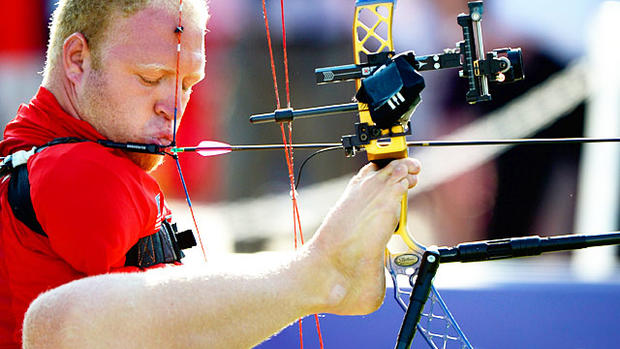Paralympics: Wheelchair tennis player Esther Vergeer wins 468th match in a row
(AP) LONDON - After more than 13 years at No. 1 in the wheelchair tennis rankings and going unbeaten since 2003 with 465 consecutive victories, Esther Vergeer entered the London Paralympics with a solid argument for being the most dominant athlete within a single sport.
The 31-year-old Dutchwoman extended that run to 468 matches with a 6-1, 6-0 win against Thailand's Sakhorn Khanthasit in Tuesday's quarterfinals.
It is widely believed that only Pakistani squash great Jahangir Khan has had a longer run of consecutive wins — 555 — but that was across five years, from 1981-86. Vergeer's run has taken more than nine years.
Former Wimbledon champion Richard Krajicek calls his compatriot "perhaps the most successful sportsperson of all time" and it's hard to argue.
"It's not a motivation itself to get to that 555 mark," Vergeer told The Associated Press at Eton Manor, a purpose-built Paralympic venue situated toward the north end of the Olympic Park in east London. "But of course I'm still trying to improve myself, I'm still trying to develop the game of wheelchair tennis.
"If it comes along with it that I win matches, maybe in a few years I'll come close to the 555. But then again there's a lot of girls who work really hard and they are right behind me. I know that. It could be any day that I lose."
The numbers Vergeer has put up since 1996, when she made her first international appearance, are staggering.
She has won 42 grand slam titles (21 singles, 21 doubles) and five Paralympic golds (three singles, two doubles). From 2004-06, she won 250 straight sets. In total, she has won 162 singles titles. And the game she lost against Khanthasit was the only one she has conceded at this Paralympics in three matches.
"My winning run brings a lot of pressure with it," said Vergeer, who has been in a wheelchair since she was 8, when an operation to correct hemorrhaging around her spinal cord left her paraplegic. "Every time I go on court a lot of people have that expectation, and that puts pressure on me. I think it will be good for the game if I lose one day, because that will mean the competition is getting stronger and that there are more girls playing at a higher level."
Vergeer is not only ahead of her rivals in terms of power, being able to fire down serves at speeds of 125 kilometers per hour (78 mph), and technique, in which her dismissive backhand is similar in style to that of Roger Federer.
She is also way ahead in terms of technology.
"Quickie," the name of the wheelchair she uses during matches, is new for the London Games and has a radical design in which Vergeer's legs and knees are locked together and tucked into a device she calls a "bucket" under the chair. In fact, it looks more like a trolley, with two wheels at the front and back. Most competitors just have one wheel at the back and their legs are apart and at right angles.
"It's totally built around me, molded," a proud Vergeer said of her contraption. "I designed it because I think in a regular chair, with a square bucket, you make a lot of movements with your hips and knees, up and down and forwards and backwards. You lose a lot of energy with that, and a lot of placement and pace.
"It's not comfortable — when I finish training or a match, it's a relief — but it works. It makes me very stable, it makes feel very strong on the court."
Vergeer, who has four sponsors to allow her to be a full-time tennis player, has a threatening and aggressive demeanor on court, where she constantly circles around in her chair ahead of receiving a serve. Never still, her reaction times are rapid and, as is to be expected from a long-time No. 1, she is a quick thinker on court.
In Tuesday's searing heat, which forced volunteers and officials to duck for cover from the sun behind the large grandstands on Centre Court, there was no hiding place for Khanthasit from Vergeer's punishing strokes.
That delighted the contingent of Dutch fans in the crowd, who wore orange T-shirts and sang songs throughout. They included her parents and brother, who hugged her as she came off court.
"Is there a secret to my success? I don't know," Vergeer said. "There's a lot of combinations and aspects that make me play well — hard work, determination, just a love of the game of tennis.
"I love to see how far I can go as myself, trying new things. And the team around me just give me all these things to try out and work on — physical, technical, tactical, equipment, nutrition, all those things. As long as I love the game, I'll continue playing."
That spells bad news for her opponents. The last rival to come close to beating Vergeer was countrywoman Korie Homan, who had a match point in the 2008 Paralympic final in Beijing but lost 6-2, 4-6, 7-6 (5).
Homan is retired now, leaving a host of up-and-coming players from the Netherlands to try and achieve what has so far proved elusive.
Next in line is third-seeded Jiske Griffioen in Thursday's semifinals. Naturally, she is seeking a first win over her training partner.
"I don't know exactly my record against her, and I don't want to search for it either," Griffioen said, laughing. "She's an amazing player and I'm going to have to play my best tennis to beat her, but she has all the pressure on her."
